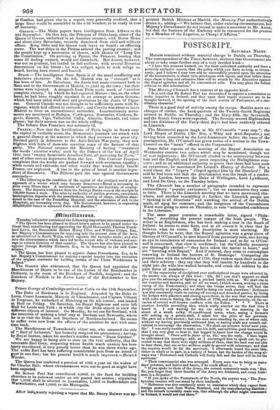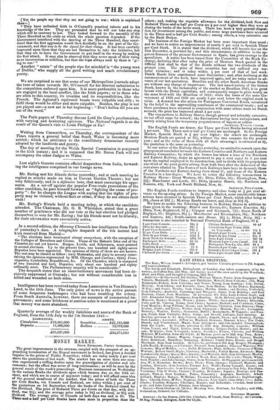POSTSCRIPT
• SA T URDAY NIGHT.
Matters remained without material change in Dublin on Thursday. The correspondent of the Tintes, however, declares that Government are about to take some further step of a very decided kind- " 1 have this moment learned, on the most undoubted authority and from a perfectly exclusive source, that the policy which you have so long, so strenu- ously, and I believe I may now add so successfully pressed upon the attention of the Government, is about tote acted upon with vigour, and that before three day s elapse a deep and extensive blow will be struck by the Executive against the Repeal agitation and all its concomitant evils. You may place the fullest reliance on this information."
The Morning Chronicle has a rumour of an opposite kind-
" It is said that Sir Robert Peel has determined to appoint a commission to make inquiries in Ireland, and that upon their report measures are to be brought forward, at the opening of the next session of Parliament, of a con- ciliatory character."
There is a good deal of activity among the troops. Besides mere ex- changes of station, the head-quarters of the Twenty-fourth Regiment arrived in Dublin on Thursday ; and the Sixty-fifth, the Seventieth, and the Scotch Greys were expected. The Seventy-second Highlanders and two divisions of the Forty-third depot had been suddenly ordered to Limerick.
The Ministerial papers laugh at Mr. O'Connell's " next step ": the Lord Mayor of Dublin (Mr. Roe, a Whig and Anti-Repealer,) not having been consulted by the Lord-Lieutenant before the issue of the proclamation, Mr. O'Connell has given notice of a motion in the Town- Council on the "insult" offered to the Corporation !
Some fuller reports of the meeting of the Repeal Association on Wednesday contain two points which may be mentioned, though not of vast importance : Mr. O'Connell alluded to the controversy between him and the English and Irish press respecting the Mullaghmast mas- sacre; and as an additional authority to prove that there had been such an occurrence, he mentioned Dr. Leland's History of Ireland. Not a word about the " forgery " alleged against him by the Standard ! He said he had been told that the proclamation was the result of a confer- ence in London, between the Duke of Wellington, Lord Lyndhurst, and Lord De Grey, on the Tuesday before.
The Chronicle has a number of paragraphs intended to represent extraordinary "popular excitement"; ; but on examination they come to little. There is the Limerick meeting that we have mentioned else- where, and another resembling it; further, the Limerick people are " running in all directions" and watching the arrival of the Dublin mails, all agog for rumours; and the burgesses of the Customhouse Ward were going to meet on Thursday, to vote "unbounded confidence in the Liberator."
The same paper contains a remarkable letter, signed " Phila. lethes," describing the present temper of the Irish people. The writer is an Englishman, who has been making a tour in the South of Ireland ; he seems to state facts, and at all events it is clear that he believes what he states. His description is most alarming. He thought before he went, that the Repeal agitation was a great piece of blarney of O'Connell's, to save himself from pecuniary ruin, also having an eye to instalments of concession for Ireland: and so far as O'Con- nell is concerned, that view is confirmed; but the Catholic peasantry are thoroughly excited—" they have taken the matter to heart," and are " bursting with Repeal." And if resisted, they seem to contemplate
renewing in Ireland the horrors of St. Domingo! Comparing the present time with the rebellion of 1798, they reckon upon their numbers and their sobriety : they say that they will tumble by hundreds in the night into the wide low-walled barracks, and crush the soldiers by the pure force of numbers- " If the superiority of disciplined over undisciplined troops were adverted to, the answer was always of this kind : ' Oh, Sir ! you don't suppose we shall
give you the advantage of fighting a pitched battle with us. We shall rise in
our counties and baronies, and do all we want, (which means, making a clean sweep of the Protestants); and when the troops arrive, they will find the people quietly at plough, and we shall be doing our work elsewhere.' Reference
was also constantly made to cutting off convoys and detached parties, by lining the hedges with pikemen and closing upon them, in the way that was practised with some success daring the rebellion of 1798, and subsequently, on the oc- casion of several well-known conflicts with the Police. • • • There is
another horrible prevailing idea, which really startled me the first time I
heard it. I was waiting for my car early in the morning in the
street of a small, sulky, ill-conditioned town; when, seeing a farmer's wife setting up a potato-stall, 1 asked her the price of her potatoes.
She gave me a civil answer ; but two men were standing by, one of whom said,
without my having previously addressed him, or having made any remark cal- culated to encourage the observation, ' We shall cat wheaten bread next year,
Sir.' I was really unable to make out his drift, and told him good-humouredly,
that I was very glad to hear it, but begged to know how the change would be brought about. There will be fewer of us, Sir,' was the reply. 1 then began to understand his meaning; and, as I encouraged him to speak out, he pro- ceeded to say that there were eight millions of them, that the land was not able to bear them, that one or two millions might be spared with advantage, and that the country would be for the survivors. I afterwards heard the same idea, either in whole or in part, in a variety of forms, but the burden of the song al- ways was Protestant and Catholic will freely fall, and the land will be for the survivors.'
" Their commissariat also was arranged. Every man was to bring so many days' potatoes, and butter and bacon, it he could afford it. • * • Ifyou spoke to them of the Army, the remark commonly made was, ' But, Sir, you forget that three-fourths of the Army are Irishmen, and every Irish- man is a Repealer.' " If you spoke of the Protestants of the North, the answer was,' The Pres- byterian tenants will not stand by their landlords.' • " Reference was also constantly made to assistance which they expect from foreign powers, and from Wales, Scotland, and the manufacturing districts ; and the remark invariably made was, that although the affair might commence in Ireland, it would not end there." [Yet the people say that they are not going to war ; which is explained thus—] " They have unlimited faith in O'Connell's practical talents and in his knowledge of the law. They are persuaded that he will not take any step which will be contrary to law. They looked forward to the assembly of the Three Hundred as the crisis on which the whole question depended. if the Government interfered with the meeting of the Three Hundred, they consi- dered that the first aggression would then decidedly be on the part of the Go- vernment, and that was to be the signal for their rising. It has been carefully impressed upon them that they are not themselves to take the initiative, but that they are to leave the Government to put itself in the wrong by making the first attack. It may also be observed that they never speak of their rising as an insurrection or rebellion, but that the term always used by them is g- ing to war.' "
Another " estate" of the people ripe for mischief is " the young men of Dublin," who supply all the good writing and much revolutionary poetry.



























 Previous page
Previous page